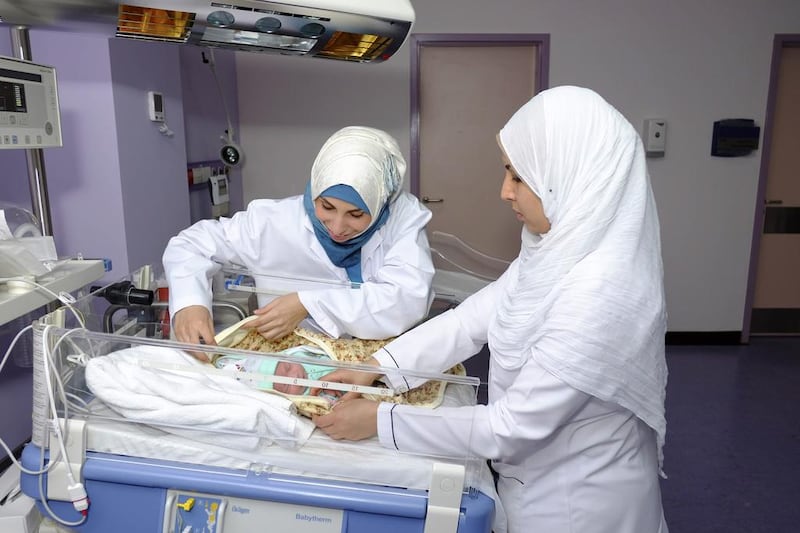RAS AL KHAIMAH // Doctors and residents have welcomed top-of-the-range facilities being built in the Northern Emirates – but they warned that “five star” infrastructure is not enough.
Millions of dirhams are being invested in new hospitals, but those living and working in the area said maintaining facilities, filling gaps in specialities and improving patient’s trust in the local healthcare system was also paramount to keep residents from travelling to the other emirates or abroad for treatment.
“A significant development here is that people now talk about quality and understand the need for quality treatment,” said Dr PK Menon, the director and professor of research at the Centre for Advanced Biomedical Research and Innovation, Gulf Medical University in Ajman.
“The way forward is that medical standards have to be implemented uniformly. Insurance should be across the board.
“Only providing infrastructure is not enough. It needs to be maintained and be made available to those who need it.”
The Dh750million Sheikh Khalifa General Hospital in Umm Al Quwain officially opened its doors on December 2, 2013 compromising of a 49,000-square-metre site.
The 248-bed Sheikh Khalifa Specialised Hospital is the next mega facility to open.
Costing Dh1 billion, the hospital is spread over 65,000 square metres. It is believed that it will open on December 2 this year.
“The facilities and infrastructure are here, but that is not everything,” said RAK resident Hanan Obaid, a 37-year-old Emirati. “The small details impact the patient and the treatment in a big way.
“I haven’t had a good experience here and don’t like the healthcare system in Northern Emirates. I prefer to go to Dubai.”
Dr Menon said investment in more specialised centres would encourage residents to be treated locally.
“People in the Northern Emirates are yet to be exposed to the kind of technology in health care that is available in the western world,” he said.
“When I tell my patients that they might have a critical problem their immediate reaction is to say that they will go back to their home countries.”
However, Dr Hillol Kanti Pal, managing director of RAK Hospital, had witnessed significant changes in recent years.
“There was never anything much here until about seven or eight years back,” said Dr Pal, an Indian-expatriate.
Dr Pal said as the health landscape flourishes trends were changing in the Northern Emirates. “When I came here the locals were not interested in getting surgery done here. That was a trend – they would rush to Abu Dhabi or Dubai.”
Now more were choosing to stay in the Northern Emirates for treatment, he said.
“That is a welcome trend,” said Dr Pal, adding that residents now have more faith in the healthcare offerings in the Northern Emirates.
“Slowly we are turning this around,” he said.
Bilal Azziez, Emirati, a 49-year-old clothes shop owner in Fujairah, preferred to be treated locally.
“Everybody wants the best when it comes to their health issues. Therefore, most of the residents prefer to go to popular hospitals.
“But, for me, I believe in government hospitals because they have professional physicians who don’t care about how much money you have. They only care about your health situation.”
However, fellow Fujairah resident Anoud Isa disagreed.
“We have a couple of good hospitals and centres here but for major issues we prefer to go to Dubai to get the medical care that we need because they have more professional and specialised doctors,” said the 34-year-old nursery worker.
“I don’t have any insurance because the company I work for doesn’t provide any medical insurance so I have to cover all the costs myself.”
This lack of universal health coverage posed a problem, said Dr Pal.
“If you need health care you have to pay for it. So a lot of expatriates would prefer to go back to their home country,” he said.
“ At this moment – this is a stumbling block. But I am sure if it was 100 per cent insurance then this would not be the case.”
Dr Mona Al Bahar, an FNC member from Dubai, said it was misconception that the Northern Emirates were often seen as the “poorer relation” to Abu Dhabi or Dubai in health care.
“I don’t think the Northern Emirates are lagging behind,” she said.
“There has been intensive work going on in developing medical facilities and infrastructure in the past few years. The new Sheikh Khalifa General Hospital that is coming up will be huge and have many specialities.
“It is also conveniently located and people in RAK and UAQ or rural areas can reach it fast. These things take time.”
The challenge, said Dr Bahar, lay in recruiting and retaining staff. “Doctors want to work in Abu Dhabi or Dubai. It is important to train young people so that we have talent who want to come back and work for the community,” she said.
jbell@thenational.ae
arizvi2@thenational.ae
* Additional reporting by Ruba Haza





